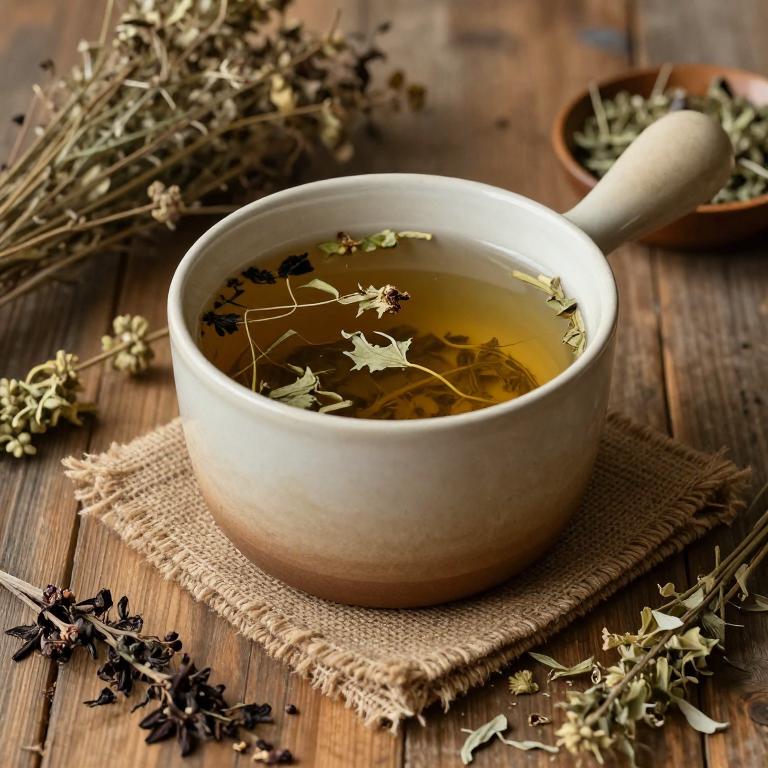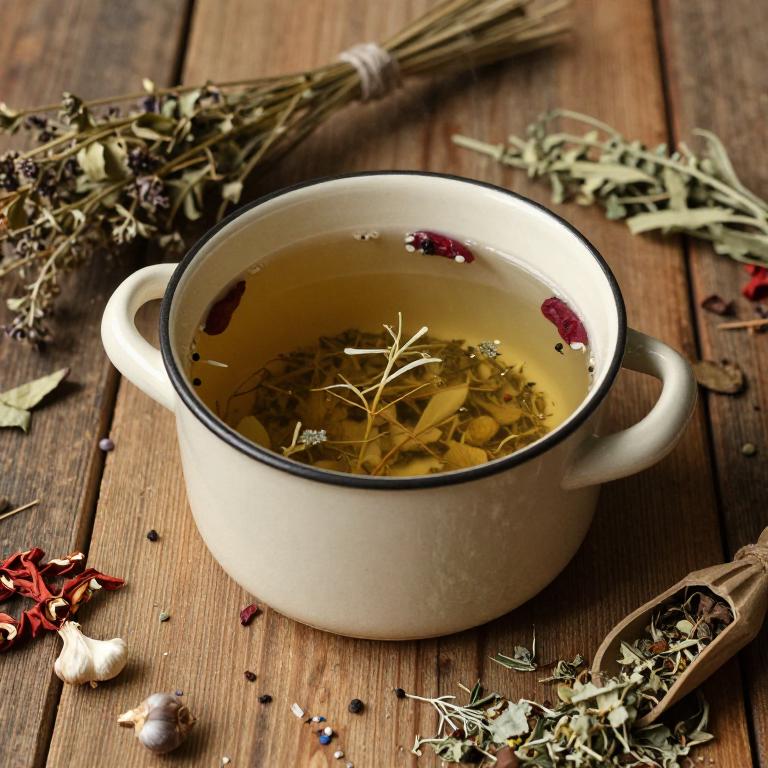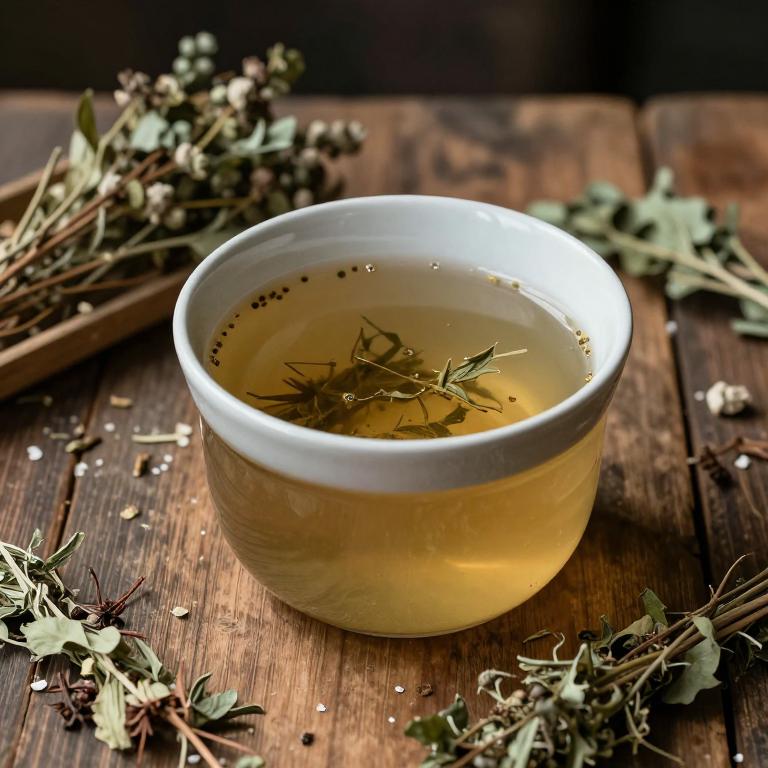10 Best Herbal Decoctions For Eye Strain

Herbal decoctions have been traditionally used to alleviate symptoms of eye strain, offering a natural and holistic approach to eye health.
Common herbs such as chamomile, green tea, and lavender are often included in these decoctions due to their calming and anti-inflammatory properties. To prepare a decoction, dried herbs are simmered in water for an extended period, allowing the active compounds to be extracted into the liquid. This soothing beverage can be consumed warm or used as a compress to cool and refresh the eyes.
While herbal decoctions may provide relief, it is advisable to consult with a healthcare professional before using them, especially for individuals with preexisting conditions or those taking medications.
Table of Contents
- 1. Field horsetail (Equisetum arvense)
- 2. St. john's wort (Hypericum perforatum)
- 3. Chaste tree (Vitex agnus-castus)
- 4. Stinging nettle (Urtica dioica)
- 5. Ginkgo (Ginkgo biloba)
- 6. Chamomile (Matricaria chamomilla)
- 7. Yarrow (Achillea millefolium)
- 8. Salvia (Salvia officinalis)
- 9. Thistle (Silybum marianum)
- 10. Camellia (Camellia sinensis)
1. Field horsetail (Equisetum arvense)

Equisetum arvense, commonly known as field horsetail, has been traditionally used in herbal medicine for its high silica content, which is believed to support eye health.
Herbal decoctions made from equisetum arvense are often prepared by simmering the dried plant parts in water to extract its beneficial compounds. These decoctions are sometimes used to alleviate symptoms of eye strain, such as dryness and irritation, due to their purported nourishing and restorative properties. However, it is important to note that scientific evidence supporting these specific uses is limited, and individuals should consult with a healthcare professional before using equisetum arvense for eye-related concerns.
Despite its traditional use, the safety and efficacy of equisetum arvense for eye strain remain topics of ongoing research and discussion in herbal medicine.
2. St. john's wort (Hypericum perforatum)

Hypericum perforatum, commonly known as St. John's Wort, is traditionally used in herbal medicine for its potential calming and restorative properties.
While primarily recognized for its use in treating mild depression, some herbal practitioners suggest that its anti-inflammatory and antioxidant compounds may offer relief for eye strain. A hypericum perforatum herbal decoction involves steeping the dried plant material in hot water to extract its active constituents, which can then be consumed as a tea. This decoction is believed to support overall nervous system function, potentially reducing the tension and fatigue associated with prolonged screen time or eye overuse.
However, it is important to consult with a healthcare professional before using this or any herbal remedy, especially if you are on medication or have existing health conditions.
3. Chaste tree (Vitex agnus-castus)

Vitex agnus-castus, commonly known as chaste tree, has been traditionally used in herbal medicine for its potential calming and hormonal balancing effects.
While it is often associated with menstrual health and stress relief, some studies suggest that its compounds may have mild antioxidant and anti-inflammatory properties that could support overall eye health. Herbal decoctions made from vitex agnus-castus may be used as a complementary therapy to help alleviate symptoms of eye strain by reducing oxidative stress and promoting relaxation of the eye muscles. However, it is important to note that there is limited scientific evidence directly linking vitex to the treatment of eye strain, and it should not replace professional medical advice or treatment.
As with any herbal remedy, it is advisable to consult a healthcare provider before use, especially for individuals with existing health conditions or those taking other medications.
4. Stinging nettle (Urtica dioica)

Urtica dioica, commonly known as stinging nettle, has been traditionally used in herbal medicine for its potential health benefits, including the relief of eye strain.
Herbal decoctions made from the leaves and stems of Urtica dioica are believed to support overall eye health due to their high content of antioxidants, vitamins, and minerals. These decoctions may help reduce inflammation and fatigue associated with prolonged screen use or reading, making them a popular remedy for modern eye strain. However, it is important to consult with a healthcare professional before using stinging nettle decoctions, as they may interact with certain medications or conditions.
Despite its traditional use, scientific research on the specific effects of Urtica dioica on eye strain is still limited, highlighting the need for further study.
5. Ginkgo (Ginkgo biloba)

Ginkgo biloba herbal decoctions have been traditionally used to support eye health and alleviate symptoms of eye strain.
These decoctions are prepared by boiling the leaves of the ginkgo tree in water, allowing the active compounds such as flavonoids and terpenoids to infuse into the liquid. The herb is believed to improve blood circulation and enhance oxygen delivery to the eyes, which can help reduce fatigue and discomfort caused by prolonged screen use or reading. Its antioxidant properties may also protect the eyes from oxidative stress, making it a popular remedy for those experiencing digital eye strain.
While some studies suggest potential benefits, it is important to consult a healthcare professional before using ginkgo biloba, especially for individuals with existing medical conditions or those taking medications.
6. Chamomile (Matricaria chamomilla)

Matricaria chamomilla, commonly known as chamomile, has been traditionally used for its calming and anti-inflammatory properties, making it a popular choice for herbal decoctions aimed at relieving eye strain.
When prepared as a herbal tea, chamomile can help soothe the nervous system and reduce the tension that often accompanies prolonged screen time or reading. Its mild sedative effects may promote relaxation of the eye muscles, offering relief from fatigue and discomfort. Some people use chamomile eye compresses, where a cooled infusion is applied to the closed eyelids, to alleviate redness and irritation.
While it is generally considered safe, it is important to consult a healthcare professional before using chamomile for eye-related issues, especially if there are underlying health conditions or allergies.
7. Yarrow (Achillea millefolium)

Achillea millefolium, commonly known as yarrow, has been traditionally used in herbal medicine for its anti-inflammatory and soothing properties.
When prepared as a herbal decoction, it may help alleviate symptoms of eye strain by reducing irritation and promoting relaxation of the eye muscles. The decoction is typically made by simmering dried yarrow flowers in water for several minutes, then allowing it to steep before consumption. While some anecdotal evidence suggests its potential benefits for eye health, scientific research on its specific effects for eye strain remains limited.
It is advisable to consult a healthcare professional before using yarrow decoctions, especially for individuals with existing eye conditions or those taking other medications.
8. Salvia (Salvia officinalis)

Salvia officinalis, commonly known as sage, has been traditionally used in herbal medicine for its calming and anti-inflammatory properties.
When prepared as a decoction, sage can be used to alleviate symptoms of eye strain by soothing irritated tissues and reducing redness. The herb contains compounds such as rosmarinic acid and flavonoids, which may help improve circulation and reduce oxidative stress in the eyes. To prepare a sage decoction for eye strain, steep dried leaves in hot water for several minutes and allow it to cool before use.
While sage decoctions are generally safe, it is advisable to consult a healthcare professional before using them, especially for prolonged or severe eye strain.
9. Thistle (Silybum marianum)

Silybum marianum, also known as milk thistle, has been traditionally used for its potential liver-protective properties, but recent research suggests it may also offer benefits for eye health.
Herbal decoctions made from the seeds of Silybum marianum contain compounds like silymarin, which are believed to have antioxidant and anti-inflammatory effects that may help reduce eye strain. These decoctions are often prepared by boiling the dried seeds in water, creating a tea-like beverage that can be consumed daily. Some studies indicate that silymarin may support the regeneration of damaged eye tissues and improve overall ocular function.
While more research is needed, many individuals use Silybum marianum decoctions as a natural remedy to alleviate symptoms of eye strain and promote eye health.
10. Camellia (Camellia sinensis)

Camellia sinensis, commonly known as the plant from which green and black teas are derived, contains bioactive compounds such as catechins and L-theanine that may support eye health.
Herbal decoctions made from Camellia sinensis are sometimes used in traditional medicine to alleviate symptoms of eye strain, including dryness and fatigue. These decoctions are believed to promote relaxation and improve blood circulation, which can help reduce tension in the eyes and surrounding areas. However, it is important to note that scientific evidence supporting the efficacy of Camellia sinensis decoctions for eye strain is limited, and more research is needed.
As with any herbal remedy, it is advisable to consult a healthcare professional before using Camellia sinensis decoctions for eye-related concerns.